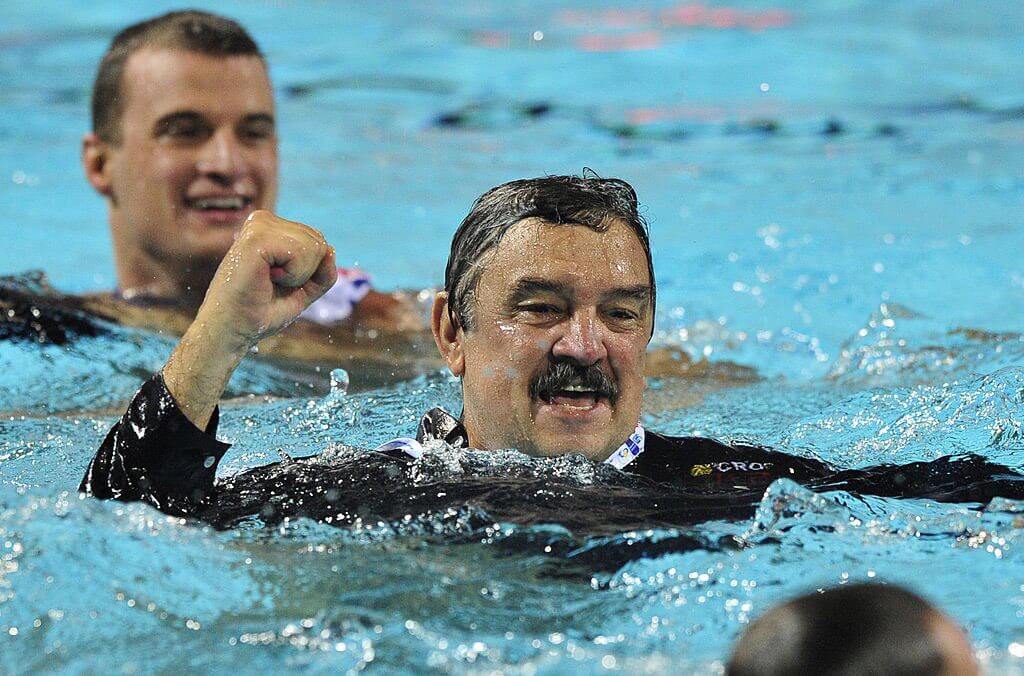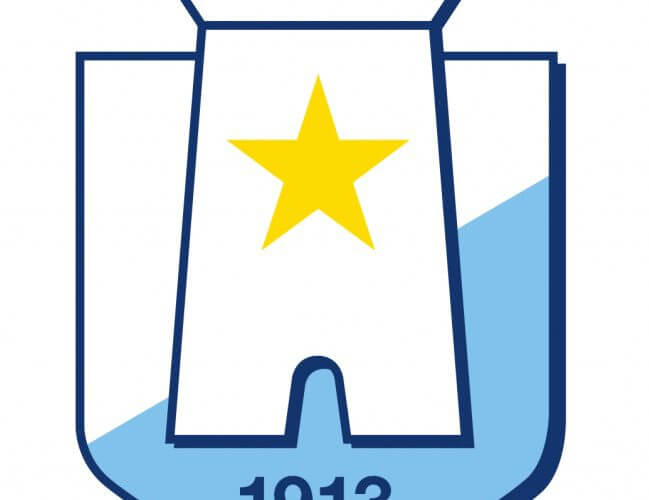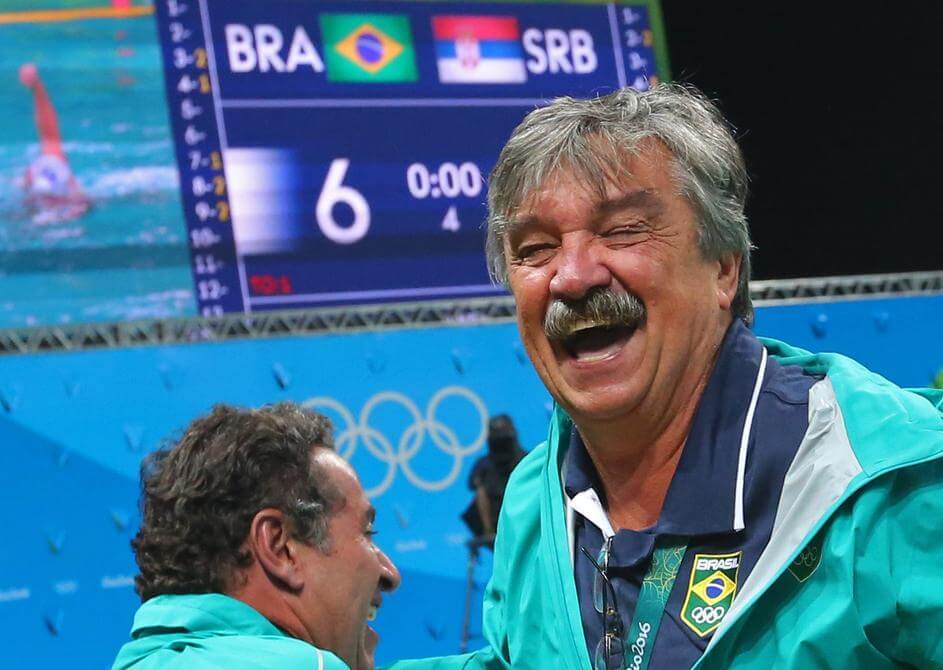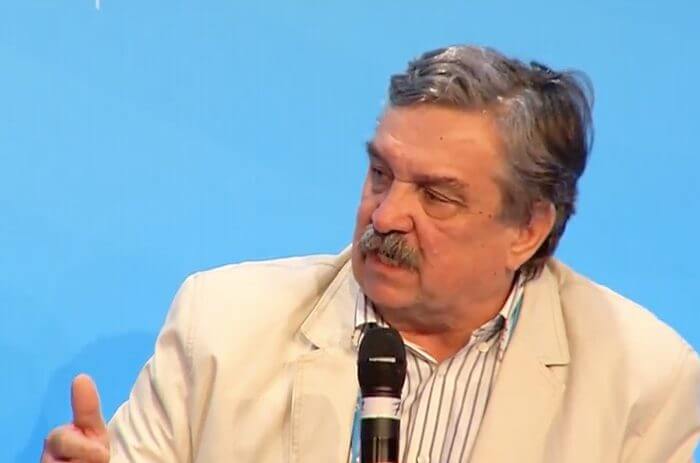On The Record with Ratko Rudic, Legendary Water Polo Coach

By Michael Randazzo, Swimming World Contributor
Without a doubt the most successful water polo coach in the history of the sport, Ratko Rudic recently surprised polo observers the world over when he came out of retirement to assume the coaching reigns at Pro Recco, arguably the world’s best professional club.

If he never coached another game, Rudic has already achieved more than any water polo coach who ever diagrammed a play. He’s led five different countries to the Olympics and won four Olympic golds—Yugoslavia in 1984 and 1988, Italy in 1992, and Croatia in 2012—the pinnacle of a career studded with countless success.
He led the United States to the Athen Games in 2004; even though the Americans did not advance to the medal round, the core of that squad captured silver at the 2008 Olympics in Beijing.
Perhaps Rudic’s ultimate success was in the 2016 Olympic Games in Rio. Coaching the host Brazilian team, he engineered a stunning upset of Serbia in pool play, the Serbians’ only stumble on their way to a gold medal.
Now, the peerless coach has a new mission: restore Pro Recco to the top of European water polo.
– Why return to coaching?
After my experience with the Brazilian national team, I declared that my coaching career was over. But when the request came from Pro Recco, I accepted almost immediately because Pro Recco is a special club, the most titled in the world, a water polo brand. Being here gives me new energy and motivation.
If I had received a proposal from another club or national, I would have refused. In Recco I felt a beautiful atmosphere and a contagious enthusiasm, decisive factors in my choice.

Photo Courtesy: Laszlo Balgoh
– You’ve already accomplished more than any water polo coach alive. What do you hope to accomplish in this latest act of your storied career?
I don’t like to say it will be the last act, now I don’t think about it. It will be exciting to train this group of players and try to give them a way to play interesting and winning. I have won everything, but one thing I miss: the Champions League and this is a great goal for me.
– You are famous for the rigorous training system you impose on your players. What changes do you anticipate for the Pro Recco roster as well as the club’s style of play?
I’ll work to have a team always ready, able to maintain an adequate physical, technical, tactical and psychological level during the entire season. Without a good foundation it is difficult to win. We have a group composed by very fast and technical players, so we can have a faster and more dynamic game. But I believe the style of play depends a lot on the type of refereeing and the criteria with which the fouls are whistled. We will have to be good to adapt.
– One of the things you mentioned is the importance of promoting water polo. How will you work with Pro Recco President Maurizio Felugo on this?
President Felugo has clear ideas about the way to promote Pro Recco and water polo. Pro Recco Academy’s project captivates young athletes and goes in the right direction: we can implement it further. Then it’s certainly important to have a tight relationship with media and to organize the events in such a way that they can interest televisions [coverage] and have a wide diffusion.
– It appears that professional prospects as well as salaries for European water polo athletes have stagnated of late. Do you feel that success by leading clubs including Pro Recco, Partizan Belgrade and Szolnok can reverse this negative trend?
This is a delicate aspect depending on club resources and state of the economy. If we continue to make water polo more popular, to make it known in the media, to create a game agreeable for people, then we can have someone who invests more in water polo. If this happens, consequently wages also increase.
– In contrast with Europe, the U.S. has seen continued growth in its youth water polo programs but has yet to break into the world’s top five men’s programs. You are likely still familiar with American polo; what’s noteworthy about the current climate there for polo?
There is a large number of water polo players in the United States, especially in California. Water polo is played in all schools, from elementary to college. The national youth teams have grown a lot, showing an improvement in the results and in the quality of the players.
The university competition is the most interesting, but it lasts for too short a time, three months, then for the rest of the season there is no activity. Athletes don’t train like in Europe and this is a limit. When I was in US, as coach of the national team, I organized a sort of Premier League with eight teams – four Americans national teams (two from South, one from North and California) and four blazoned clubs—it was a good experience. I think it’s necessary to organize a semi-professional league in which all players can play, even the university ones, for all the season; It can be done with the support of the Federation [USA Water Polo].

Photo Courtesy: FINA
– Is a professional polo league in North America-which you championed when you led the U.S. Senior Men’s Team-an idea whose time will someday come? How important is such a league to the sport’s future?
An investment is required: if the resources are found and newspapers and TV are attracted, then I think it becomes a possible thing.
– You recently attended the FINA World Water Polo Conference in Budapest. How vital is it to make changes to polo at this time-or is the sport doing fine as it is?
The main aim is to create a water polo development system as requested by the CIO. Water polo must be present on all continents, bringing young people closer to this sport through, for example, the use of new media: the last World Cup in Budapest has been followed by many people via streaming.
Marketing and organization are the aspects on which we must push and improve, on this the FINA conference has focused a lot: it’s been a very interesting conference, I’ve heard great ideas. Then we have to think about creating a clearer water polo for the spectators, with simple rules that everyone can understand: a game therefore faster, more technical and less physical. Some ideas have been proposed, tests will be made before the Olympic Games, but the priority is to work about what happens outside the water.



